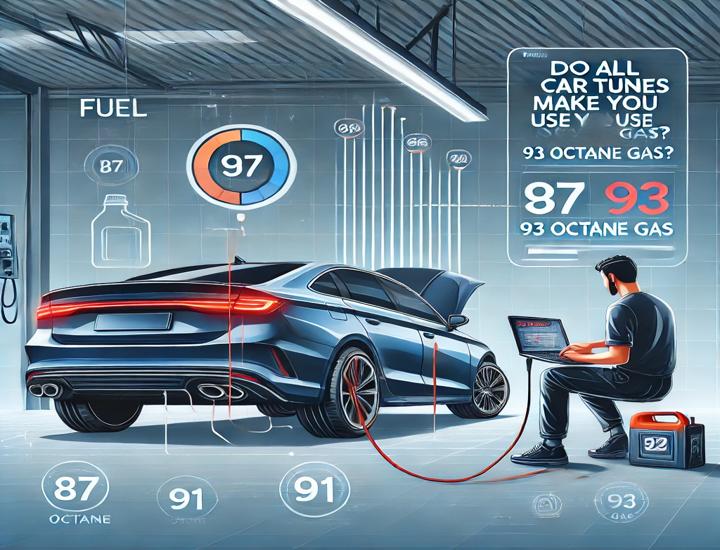Car tuning is popular for drivers who want better performance. But many people wonder, “Do all car tunes make you use 93 octane gas?” The answer depends on the type of tune, your car, and your driving goals. Let’s break it down in simple terms.
What Is Car Tuning?
Car tuning is when you adjust your car’s engine settings. This can make your car faster or more fuel-efficient. Mechanics or tuning software are often used to change how the engine works. Many people tune their cars to improve speed or power.
What Is 93 Octane Gas?
Gasoline has different octane levels. Regular gas is usually 87 octane, while premium is 91 or 93. Higher octane gas is better for engines that need more power. It prevents knocking, which happens when fuel burns unevenly. Cars that need 93 octane gas often have high-performance engines.
Do Tunes Always Require 93 Octane?
Not all tunes require 93 octane gas. It depends on the type of tune and your car’s engine. Some tunes work with regular gas. Others are made for premium gas. Performance tunes usually need 93 octane because they push the engine harder.
Why Some Tunes Need 93 Octane
High-octane gas helps the engine perform better. When you use 93 octane, the engine runs smoothly even at high speeds. Tuning changes how the engine works, often increasing the power. If your car is tuned for performance, it might need 93 octane to avoid engine damage.
How To Know What Gas Your Tune Needs
The tuner or software will tell you what gas to use. If the tune is for 93 octane, you must use it. Using lower-octane gas can cause problems like knocking or lower performance. Always check the tune’s instructions.
Types of Tunes
There are different types of car tunes. Some focus on power, while others improve fuel efficiency. Let’s look at the main types:
-
- Performance Tunes: These increase horsepower and speed. Most performance tunes need 93 octane gas.
-
- Eco Tunes: These focus on saving fuel. Eco tunes often work with regular gas.
-
- Custom Tunes: A mechanic adjusts your car’s settings for your needs. The gas required depends on the tune.
High-Performance Cars
High-performance cars often need premium gas even without tuning. When tuned, they almost always require 93 octane gas. These cars have engines designed for speed and power. Regular gas can’t handle the demands of these engines. That’s why many sports cars come with a recommendation for premium fuel.
What Happens If You Use the Wrong Gas?
Using the wrong gas in a tuned car can cause problems. Here are some issues:
-
- Engine Knocking: This happens when fuel burns unevenly. It can damage the engine over time.
-
- Reduced Power: Your car might feel slower if you use low-octane gas with a high-performance tune.
-
- Higher Repair Costs: Engine damage from using the wrong gas can lead to expensive repairs.
Engine Calibration
Engine calibration plays a big role in tuning. A tune changes how the engine’s computer manages fuel, air, and timing. High-octane gas is often needed to match these changes. Proper calibration ensures the car runs smoothly and avoids damage.
Do Stock Cars Need 93 Octane?
Most stock cars don’t need 93 octane. They are designed to run on regular gas unless stated otherwise. However, some high-end models recommend or require premium gas. Always check your car’s manual to know what’s best.
Can You Avoid Using 93 Octane After Tuning?
If you don’t want to use 93 octane gas, talk to your tuner. They might offer a tune that works with regular gas. Keep in mind that these tunes might not provide as much power. It’s a trade-off between cost and performance.
Fuel Efficiency
Fuel efficiency is another reason people tune their cars. Eco tunes can save money by improving mileage. These tunes usually work with regular gas. However, the gains in fuel efficiency might not be as dramatic as the power increases from performance tunes.
How to Save Money on Gas
Using 93 octane gas can be more expensive. Here are some tips to save money:
-
- Drive Smoothly: Avoid rapid acceleration and braking. This helps your car use fuel more efficiently.
-
- Tune for Regular Gas: Ask for a tune that works with 87 octane if you don’t need high performance.
-
- Shop Around: Gas prices vary by station. Find a station with affordable premium fuel.
Engine Performance
Engine performance improves with the right tune and fuel. High-octane gas allows the engine to run at its best. If you love speed and power, using 93 octane is worth it. For daily driving, a tune that works with regular gas might be enough.
Are Tunes Worth It?
Tunes can make a big difference in how your car drives. If you want more power, a performance tune is worth it. Just be ready to pay for 93 octane gas. An eco-tune might be a better choice for those who want to save on fuel. Always think about your needs before tuning your car.
Tuning Benefits
The benefits of tuning depend on your goals. Some people want speed, while others want better mileage. Tuning can also make your car more fun to drive. It’s important to weigh the costs, like using 93 octane gas, against the benefits you’ll get.
Final Thoughts
Do all car tunes make you use 93 octane gas? The answer is no, but many performance tunes do. It’s important to know what your tune requires. Using the wrong gas can hurt your engine and cost you more in the long run. Talk to your tuner, check your car’s needs, and choose the best option for your driving style. Your car can perform at its best with the right tune and fuel.

